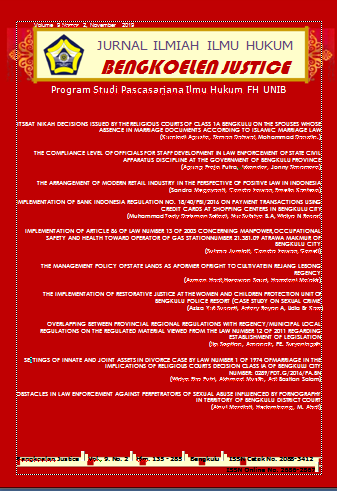Main Article Content
Abstract
In Bengkulu city, there is a marriage phenomenon done by the cultural law but not legally acknowledged in the data of ministry of religious office. Such a particular situation results in the absence of legal standing in terms of data. This being the case, spouses then ask for official marriage decisions or itsbat Nikah to the office of ministry of religious so that they would receive marriage letter. To answer the problems, the method used is empirical law research method. Data are obtained through observation and interviews to informant judges, clerks and seekers of justice who apply for marriage. Furthermore, it is analyzed by qualitative juridical with deductive and inductive method, thus it can be drawn a conclusion to answer from every existing problem. The results of this study indicate that: 1) many spouses do not have a marriage document since they avoid sin due to adultery, and feel not ready materially and socially, become pregnant out of marriage, and are overwhelmed with the assumption that whether having marriage documents or not will be the same, 2) the legal consequences of marriage without a marriage certificate are considered invalid because such a marriage is illegal under the law No. 1/1974 stating that the wife also has no right to the livelihood and inheritance of the husband if he dies and is not entitled to, (3) the religious courts of Bengkulu states that it is important to issue the-so-called itsbat Nikah or official documents to the spouses who have yet to legally declare their marriage as stated in the decree No.1/1974 for the betterment of the society.
Keywords
Article Details
References
- Bahder Johan Nasution, MetodePenelitian Ilmu Hukum,Mandar Maju, Bandung, 2008.
- Direktorat Badan Peradilan Agama Mahkamah Agung RI, Buku II Pedoman Pelaksanaan Tugas dan Administrasi Peradilan Agama. Mahkamah Agung RI, Jakarta.
- Yusna Zaidah, Itsbat Nikah Dalam Perspektif Kompilasi Hukum Islam Hubungannya Dengan Kewenangan Peradilan Agama, http://www.media.neliti.com.
References
Bahder Johan Nasution, MetodePenelitian Ilmu Hukum,Mandar Maju, Bandung, 2008.
Direktorat Badan Peradilan Agama Mahkamah Agung RI, Buku II Pedoman Pelaksanaan Tugas dan Administrasi Peradilan Agama. Mahkamah Agung RI, Jakarta.
Yusna Zaidah, Itsbat Nikah Dalam Perspektif Kompilasi Hukum Islam Hubungannya Dengan Kewenangan Peradilan Agama, http://www.media.neliti.com.

